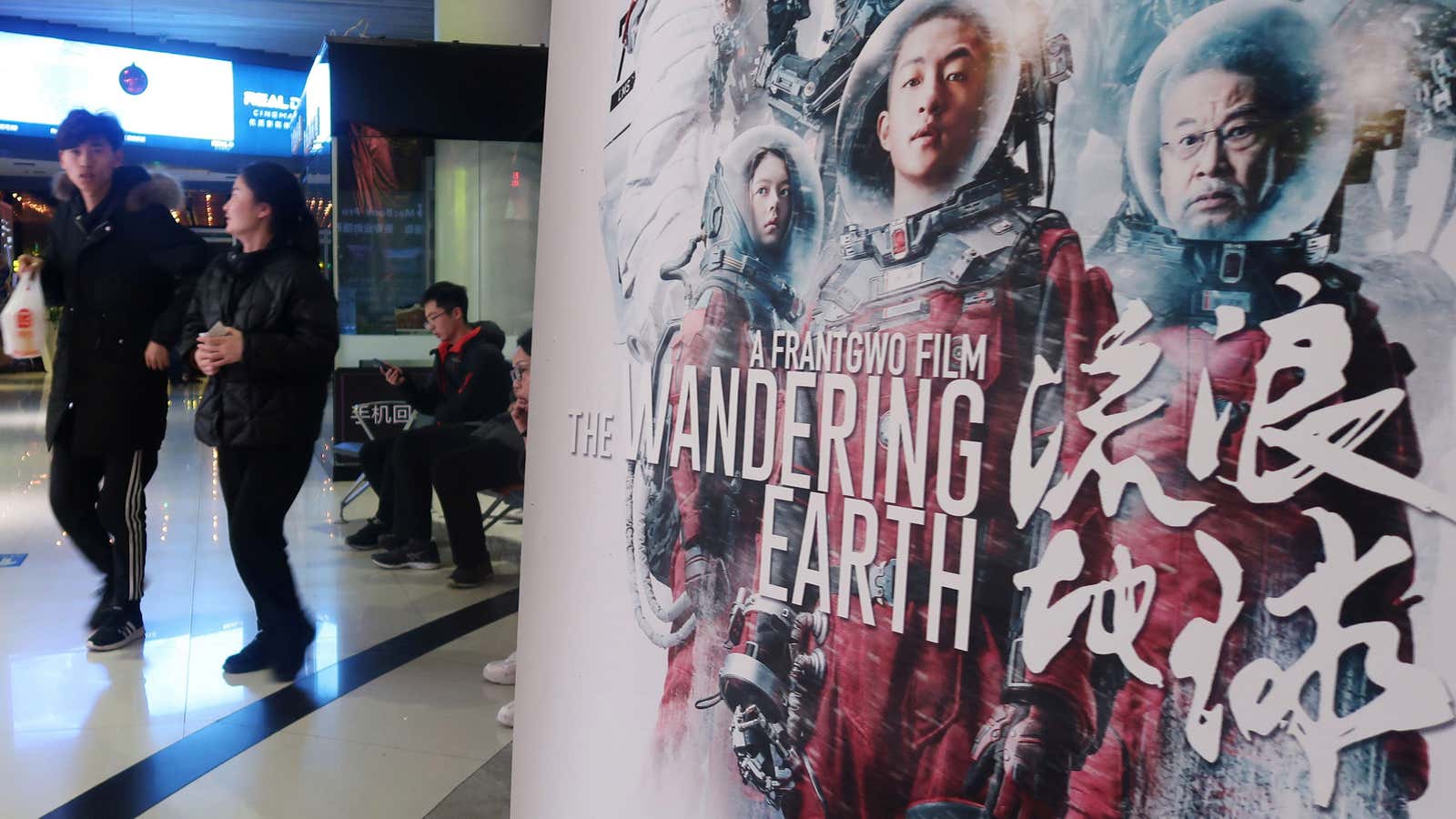A sci-fi blockbuster that could become China’s top-grossing movie ever imagines a future where humans face the collapse of their solar system—and it’s China that saves the world.
The Wandering Earth, the country’s second highest-grossing film of all time, has taken in some 4.2 billion yuan ($630 million) at home since it arrived in cinemas on the first day of China’s Lunar New Year (Feb. 5), and is also out in the US, Canada, Australia, and New Zealand. Last week, Netflix announced it had bought the streaming rights of the sci-fi film.
The space-exploration movie, based on a novel by cult Chinese sci-fi writer Liu Cixin, comes as China is rapidly developing space missions to compete with traditional space powers like the US and Russia. Last month it pulled off the first-ever landing on the far side of the Moon, and is now developing its own space station, with the first module set to launch as soon as 2020. Those ambitions are amply reflected in the movie, as are China’s overtures to other nations to cooperate with its space program.
In the movie, co-produced by China Film Group and Beijing Culture at a budget of close to $50 million (paywall), and set three decades in the future, the Sun has become so unstable that it will eventually engulf the Earth—so China’s space scientists propose moving the earth to another spot in the universe. Easy-peasy, right?
Guided by China’s space station, the earth embarks on a journey powered by thousands of giant thrusters built around the world. On its way out, the Earth is nearly consumed by the gravity pull from Jupiter, but scientists, regular people, and an astronaut from China—played by actor Wu Jing—unite to prevent it in a global rescue effort. One comment on social media Weibo noted the film presents a strong contrast (link in Chinese) to US blockbusters, which often portray an individual hero saving the world in a doomsday scenario. (A snarkily titled Economist story describes the movie as “Xi Jinping Thought saves the world,” a reference to a Xi remark on mankind’s shared future that surfaces regularly in state media.)
But while scientists and special task forces from Russia, France, the UK, Israel, India, Korea, and Japan all contribute to the final rescue—under Chinese leadership—little is seen of NASA or American space engineers.
“In this global project, there is Sino-Russian cooperation, a little French, two Japanese—but why is the United States absent? Curious,” said a reviewer using the handle “frozen moon” on the Chinese movie-review site Douban.
A Weibo user was more whole-hearted: “I like this movie, it’s finally China’s turn to save the Earth. And the US is barely counted in the game.”
Some viewers turned to Liu’s 2008 story (link in Chinese) of the same title, to shed light on the US invisibility. In the book, American scientists have their own ideas about how to save the world—so the US withdraws from the Wandering Earth project supported by the United Nations in 2029. Instead, they seek to migrate humans on spacecraft, a plan that later has to be abandoned after riots break out when people find that the only the rich with a net worth of more than $30 million will be transported. At that point, China’s already leading in thruster technology, so it leads the project to move the earth.
It’s unclear why the movie left out these plot details, but in an interview with The Hollywood Reporter, the movie’s director, Guo Fan (who goes in English by Frant Gwo), thanked Liu for giving him a lot of space in making the movie, adding, “If we tried to tell an entire Liu Cixin story in two hours, it would become like an educational documentary about the future development of humanity.”
Guo has also said the movie is a reflection of a different approach to saving humanity. “It reveals the core value in China’s cultures—our deep affections to the land and home—that’s why we need to drag our ‘home’ with us when embarking on the journey to escape,” said Guo (link in Chinese) in an interview with state newspaper Global Times.
The writer Liu’s actually better known for his other work—the Hugo Prize-winning The Three-Body Problem, praised by many, including former US president Barack Obama and Facebook’s founder Mark Zuckerberg. But some fans, aghast at this rendering of his work, which they say leaves out his depictions of the universe, and his observations of society and human beings, are now fearful of what will become of his seminal work once it’s transformed into a movie or TV series. Amazon is reportedly hoping to turn it into a Game of Thrones-style success.
Regardless, the movie has managed to draw the crowds. On Douban, China’s IMDb-equivalent platform, the movie has a rating of 7.9/10—meaning it’s beating about 80% (link in Chinese) of movies in the sci-fi category, which includes foreign titles. The film gets a 67% Rotten Tomatoes score from critics, and a higher audience score of 82%.
The film’s popularity in China is no doubt due to Liu’s die-hard fans, and also the clear appeal of patriotic movies to Chinese audiences. China’s all-time top-grossing movie, 2017’s Wolf Warrior 2—Wu also played its hero—is about a former Chinese special-forces soldier who saves compatriots and locals in an African country from American-led mercenaries. And the second-highest grossing movie, Operation Red Sea, is based on the Chinese rescue of several hundred of its nationals from war-torn Yemen in 2015.
Some predict The Wandering Earth could overtake both of those films and become China’s biggest earner ever, especially now that China’s giving it the Wolf Warrior treatment, and extending its cinema run by two months (link in Chinese).
